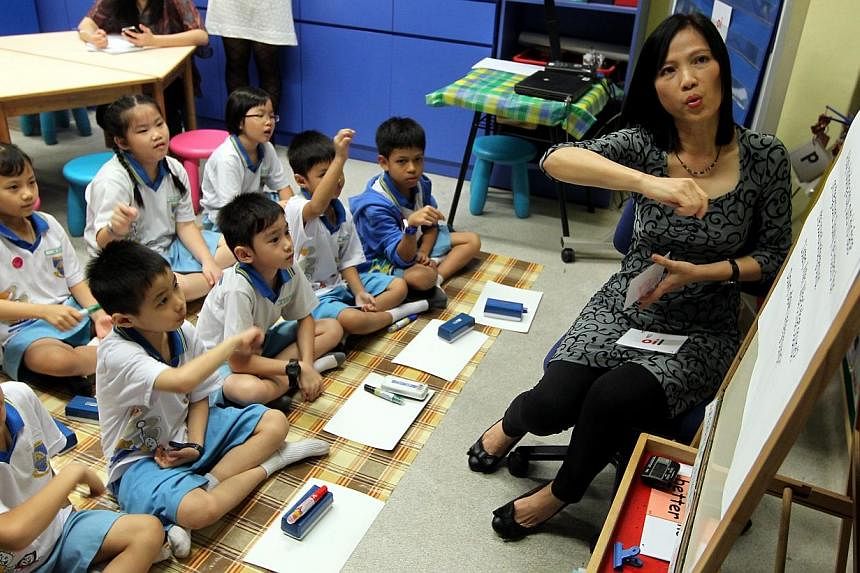SINGAPORE - Singapore's 33,000-strong teaching force is among the youngest in the world - 36 years old compared with 43 on average worldwide - but they are well-trained before going into the classrooms, seek continual training and feel valued by society, according to a global survey of teachers.
The five-yearly Teaching and Learning International Survey (Talis) that saw 34 countries taking part last year, also found Singapore teachers among the most hardworking. The 3,109 lower secondary teachers from 159 school who participated in the study said they worked 48 hours a week on average, 10 hours more than the Talis average of 38 hours. The hours included teaching time as well as time spent on planning for lessons, student counselling and running co-curricular activities.
Those surveyed reported spending eight hours a week on average on planning their lessons, nine hours a week on marking and five hours a week on administrative work. Teachers from the other countries surveyed spent an average of seven hours on lesson planning, five hours on marking and three hours a week on administrative matters. Japanese teachers reported working even longer hours - 54 hours in a week, while American teachers reported working 45 hours a week and Australians, 43 hours a week, in the Organisation for Economic Cooperation and Development survey.
The survey asked teachers about their work including their initial teacher education and professional development, what sort of appraisal and feedback they get, the school climate, their school heads and about their instructional beliefs and teaching practices.
This is the first time that Singapore is taking part in Talis, which conducted its second study last year. It aims to provide cross-country analysis that will help countries identify others facing similar challenges and learn from each other.
Ms Ho Peng, the Ministry of Education (MOE)'s director-general of education, said a key factor for Singapore's success in education is the quality of teachers.
"This has been painstakingly built up since the early 2000s. Teachers are key to the delivery of quality learning experiences for all our students. Ensuring that our teachers are competent and professional is critical," she said.
In its press release, the MOE also highlighted how most Singapore teachers - 88 per cent- said they were satisfied with their job - which MOE said is comparable to the Talis average of 91 per cent. The MOE also noted that most Singapore teachers - 82 per cent - would still choose to be a teacher if they were to decide on a career again.
With regards to the finding on the average age of Singapore teachers - 36, compared to 43 on average - MOE said young teachers bring "diverse perspectives and renewed energy into the teaching force". It also noted that they come up with innovative ways to engage students in the learning of 21st century competencies by using IT tools.
When asked about the finding on the working hours of teachers, Mr Wong Siew Hoong, Deputy Director-General of Education (Curriculum) said MOE appreciates that all our teachers work hard and want to do the best for their students.
But he added: "MOE will look at what is the right work-life balance for teachers and how teachers can be supported better."
In recent years MOE has increased the support staff in schools. To date there are 387 school counsellors, 365 allied eductors who work with special needs children in mainstream schools and 1,500 allied educators who play roles including helping teachers run special programmes for children lagging behind in mathematics and English.


